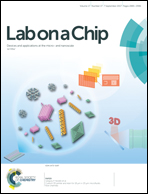Characterisation of anticancer peptides at the single-cell level†
Abstract
The development of efficacious anticancer therapeutics is difficult due to the heterogeneity of the cellular response to chemotherapy. Anticancer peptides (ACPs) are promising drug candidates that have been shown to be active against a range of cancer cells. However, few ACP studies focus on tumour single-cell heterogeneities. In order to address this need, we developed a microfluidic device and an imaging procedure that enable the capture, monitoring, and analysis of several hundred single cells for the study of drug response. MCF-7 human breast adenocarcinoma cells were captured in hydrodynamic traps and isolated in individual microchambers of less than 100 pL volume. With pneumatic valves, different sets of microchambers were actuated to expose the cells to various drugs. Here, the effect of three membranolytic ACPs – melittin, aurein 1.2 and aurein 2.2 – was investigated by monitoring the efflux of calcein from single MCF-7 cells. The loss of membrane integrity was observed with two different strategies that allow either focusing on one cell for mechanistic studies or parallel analysis of hundreds of individual cells. In general, the device is applicable to the analysis of the effect of various drugs on a large number of different cell types. The platform will enable us in the future to determine the origin of heterogeneous responses on pharmacological substances like ACPs within cell populations by combining it with other on-chip analytical methods.



 Please wait while we load your content...
Please wait while we load your content...